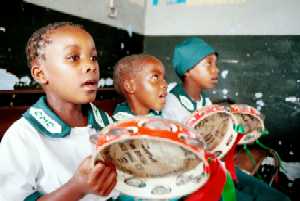 Delegates,
visitors and staff piled into minibuses on Sunday morning to spread out across
Harare and into neighbouring towns and countryside, where they shared in the
multi-faceted worship of Christ’s people in Zimbabwe.
Delegates,
visitors and staff piled into minibuses on Sunday morning to spread out across
Harare and into neighbouring towns and countryside, where they shared in the
multi-faceted worship of Christ’s people in Zimbabwe.
In Chitungwiza, Zimbabwe’s third largest city, a striking scene greeted assembly
guests. Nearly 200 people sang, danced between the rows of seats and in the aisles,
clapped their hands and prayed in tongues.
They ceremonially washed and dried the visitors’ hands and offered them cool drinks,
cake and Zimbabwe biscuits before the visitors left -- after the second hour of the
three-hour service. Then they sang and danced with us, holding our hands, as the whole
congregation come to the door to wish us farewell.
They were from the Christian Marching Church, formed in Zimbabwe in 1956 and derived from
the Salvation Arm. Its people use tambourines — as only Africans could use them
— as well as traditional African drums and hosho, traditional rattles made
from small dried pumpkins with stones, or dried fruit, or small pieces of metal inside.
Everything was said was in English or Shona -- unless it was in tongues. The normal speech
was translated from one language to the other.
The gospel reading was the story of Christ calming the waters. "We have problems,
like those people in the boat," their local minister, the Rev Richard Shambare, said.
"Jesus was asleep. They woke him and the problems were solved.
"In our lives there are lots of problems. But we have Jesus. When problems come into
our lives, if we have faith in Jesus, those problems are solved. If we have hope in Jesus,
our problems are solved. If was put our trust in Jesus, we will be safe."
Mr Shambare said before the service that Chitungwiza was a resettlement housing area
established in the late 60s. He said six or seven families lived in each of the small
houses. "There are no tensions between the families," he said.
"They’re used to it.
"The unemployment here is very high, more than 60 per cent. Those who have work are
mainly self-employed, selling things like vegetables. Some work in the industrial area
very close by. The big clothes and textile factory closed recently and 6,000 people lost
their jobs. There were just abandoned."
Among the children, Leo 11, walks to church each Sunday with his sister, Colleen, 7, his
brother, David, 8, and his parents. "It takes one and a half hours to walk here and
the same to walk back. But we do it because this is the best church and I trust it."
In New Mabvuku, a community 25 kilometres outside Harare that would once have been called
a township and is now styled "a high-density suburb", stands the Church of
Central African Presbyterian. The small, single-storey concrete chapel was across a broad,
dusty road from the market place, where tables were set out with vegetables and fruit, and
chickens clucked in a metal cage, stands.
The church serves two congregations. After members of the Dutch Reformed Church had filed
out from their worship, the Presbyterians began to gather for a harvest thanksgiving,
though without the display of produce familiar to Western churchgoers. A circle of two
dozen children clapped, sang, swayed and giggled as a teenage girl in the centre kept
rhythm on a tall drum. Behind them, a white wooden cross hung against the blue chancel
wall, and a simple table and pulpit were decorated with flowers whose vases were rusty
catering tins covered with pages cut from magazines.
A similar number of adults took their places on dark wooden benches beneath the asbestos
roof, men on one side and women, some wearing a membership uniform of white hat and blouse
and black skirt, on the other. They clapped their way through a hymn of praise driven
along by the drum and rattles, and then the choir of four men and four women slipped into
that soft, harmonious, unaccompanied singing that so enchants visitors to Africa.
Pastor Tinashe Chemvumi, a young, broad-shouldered six-footer, his clerical collar set off
by a green shirt and yellow jacket, prayed with his people in Shona and offered a smiling
welcome to the WCC guests. As they introduced themselves and brought a special greeting
from Presbyterians in Missouri, the congregation applauded and whooped, then listened
attentively as a sermon by a Church of Sweden clergyman, preached in English, was
translated phrase by phrase into Shona by a church elder.
But for WCC visitors in all the churches, the message of their hosts’ smiling faces
and warm handshakes needed no translation.
Back to top



Delegates, visitors and staff piled into minibuses on Sunday morning to spread out across Harare and into neighbouring towns and countryside, where they shared in the multi-faceted worship of Christ’s people in Zimbabwe.
